The Ruling Class and the State: An Anthology
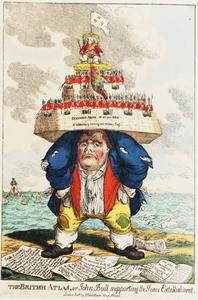 |
The Ruling Class and the State:
|
Table of Contents
[Created: January 7, 2018]
[Revised: February 6, 2018]
Note: This is a work in progress. This section currently contains 68 items by 50 authors.
Introduction
This Anthology of longer pieces can be read alongside the collection of shorter quotes about Class | Origin Of Government | Presidents, Kings, Tyrants, & Despots | and The State.
The link attached to the author's name will take you to the main author page which lists all works by that person in the OLL collection. The items in the anthology can be read as shorter, individual files ("the extract") or as part of the larger work (usually a book) from which they were taken (the "Source"). In some cases we do not have the electronic rights to some titles published by Liberty Fund (by Hayek and Tullock for example). In these cases we will indicate the relevant chapters ancd pages numbers in the printed version.
Unlike the Marxist tradition of class analysis, the radical individualists, political economists, classical liberals, and libertarians have never settled upon an agreed terminology when talking about ruling elites and classes, and the nature of exploitation or plunder. The Marxists quickly settled on the terms capitalists and the bourgeoisie which constituted the ruling class which exploited the working class (the proletariat). To aid the reader, we will list in the table of contents some of the key terms and ideas used by each of the authors in our collection.
See a discusion of this (and other related topics) in the Liberty Matters online discussion of "Classical Liberalism and the Problem of Class".
The image is James Gillray, "The British Atlas, or John Bull supporting the Peace Establishment" (1816). [See a higher resolution image and the illustrated essay on "James Gillray on War and Taxes during the War against Napoleon".
Contents
16th and 17th Century | 18th Century | 19th Century English Radicals and Benthamites | English Political Economists | 19th Century French Classical Liberals | 19th Century English Classical Liberals and Cobdenites | 19th Century American Works | 20th Century
16th and 17th Century Works
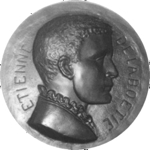

-
Étienne de la Boétie, "Discourse of Voluntary Servitude" (1549, 1576).
- Some key words and ideas from the text: idea that society is shaped like a pyramid with single tyrant at the top; raises questions why large majority at bottom pay taxes and obey orders of those at the top; key words: a single little man; this single tyrant; a single clique; these favourites; tyrants and their accomplices; the tyrant vs. the few, the lovers of freedom and the brutish mass; bullocks, prey, natural slaves; petty chiefs under the big tyrant; pyramid structure of power: 6 have access to his/tyrant’s ear, they have 600 who profit under them, then they have 6,000 under them who are made governors of provinces and direct the state’s finances; man-eaters.
- Étienne de la Boétie, “The Discourse of Voluntary Servitude” (1576) (Part III)] from The Discourse of Voluntary Servitude
-
The Levellers (Richard Overton (1631-1664), William Walwyn (1600-1681), and others).
- Some key words and ideas from the text: on the politically privileged as “caterpillars” eating the people’s wealth; the Mill Horse vs. the War Horse on the different productive contributions of two groups to society - the industrious mill horse who makes flour for bread vs. the war horse who takes the soldiers into battle to kill and destroy; and the estblished state church being like so many wolves attacking the religious flock of sheep.
- Richard, Overton, "The Frogges of Egypt, or the Caterpillers of the Commonwealth" (August, 1641) from Tracts on Liberty by the Levellers and their Critics Vol. 1 (1638-1643) (2nd ed)
- Anon., A Dialogue betwixt a Horse of Warre and a Mill-Horse (2 January, 1644). [Extract] and [Source].
- William Walwyn, An Antidote against Master Edwards his old and new Poyson (10 June 1646). [Extract] and [Source].
18th Century Works↩
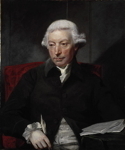

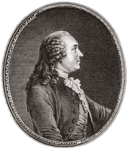


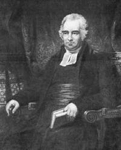
-
John Trenchard (1662-1723) and Thomas Gordon (1692-1750), Cato's Letters (1721) - the activities of corrupt Ministers of a King or Prince, magistrates who become the enemies of the people; oligarchy as a "gradation of tyrants" and "deputy tyrants"; the behaviour of parties in and out of power. Key words: faction; spoil; parasite - court parasites, the instruments and parasites of power; flatterers; standing army; ministers; magistrates; corruption, dabblers in corruption; oligarchy; parties; limited monarchy
- No. 16. John Trenchard, “On the Nature of Political Parties” (Feb. 11, 1721). [Source].
- No. 17. John Trenchard, "On wicked and desperate Ministers" (Feb. 18, 1721).[Source].
- No. 33. Thomas Gordon, "On the natural Encroachments of Power" (June 17, 1722).[Source].
- No. 72. Thomas Gordon, "On Government as a Gradation of Tyrants" (April 7, 1722).[Source].
- No. 96. Thomas Gordon, “On the Behaviour of Political Parties in and out of Power” (Sept. 29, 1722).[Source].
- Edmund Burke (1729-1797), A Vindication of Natural Society (1756). [Source].
- Adam Ferguson (1723-1816), An Essay on the History of Civil Society (1767)
- John Millar (1735-1801), The Origin of the Distinction of Ranks (1771)
-
Turgot (1717-1781), Reflections on the Formation and the Distribution of Riches (1776)
- Key words: 4 stage theory, two classes - productive class and stipendiary class; three classes - productive, stipendiary, and disposible classes; productive vs “barren” class
- selections: chaps 8, 15-18, 61, 65, 93-96, 99-100. [Source].
- David Hume (1711-1776), Essays Moral, Literary, Political (1777, LF book)
-
Adam Smith (1723-1790)
-
The Theory of Moral Sentiments (1759).
- Key words: rank, corruption, party, party-man (partyman), faction, the laws of faction, violence of faction, furious faction, spirit of system
- Part I "Of the Sense of Propriety", Section III, Chap. II "Of the Origin of Ambition, and of the Distinction of Ranks" [Source]
- Part III. Of the Foundation of our Judgments concerning our own Sentiments and Conduct, and of the Sense of Duty, Chap. III "Of the Influence and Authority of Conscience", Beginning "The animosity of hostile factions, whether civil or ecclesiastical, ..." [Source]
- Part VI. Of the Character of Virtue, Section II, Chap. II "Of the Order in which Societies are by Nature recommended to our Beneficence", Beginning "Every independent state is divided into many different orders and societies ..." [Source]
- Selections from Lectures on Jurisprudence (1763) and The Wealth of Nations (1776): [Extracts]
-
The Theory of Moral Sentiments (1759).
-
Thomas Paine (1737-1809), Various Works
- Rights of Man. Part Second, Combining Principle and Practice (1792) - English monarchy
- “Letter Addressed to the Addressers on the late Proclamation (June, 1792) - two classes, placemen, pensioners, civil list. [Source].
- The Decline and Fall of the English System of Finance (1796) - English system of finance. [Source].
-
James Madison (1751-1836), The Federalist (1787) - on factions
- No. 10. [Source].
-
Mary Wollstonecraft (1759-1797), A Vindication of the Rights of Woman (1792) - women as an unequal class under the law
- Chap. IX: "Of the Pernicious Effects which arise from Unnatural Distinctions established in Society". [Source].
-
William Godwin (1756-1836), An Enquiry Concerning Political Justice, and its Influence on General Virtue and Happiness (1793) - critique of monarchy, aristocracy, and ministers
- Vol. 2, Book V.: Of Legislative and Executive Power.
- Book VI.: Of opinion considered as a subject of political institution.
- CHAP. IX.: of pensions and salaries. [Source].
-
Vicesimus Knox (1752-1821), The Spirit of Despotism (1795)
- Key words: ministerial oligarchy, corruption, and war
- SECTION XXIX. Of the Despotism of Influence; while the Forms of a free Constitution are preserved. [Source].
- SECTION XXX. The Spirit of Despotism delights in War or systematic Murder. [Source].
- SECTION XXXII. On Political Ethics; their chief Object is to throw Power into the Hands of the worst Part of Mankind, and to render Government an Institution calculated to enrich and aggrandize a few, at the expense of the Liberty, Property, and Lives of the many. [Source].
19th Century English Radicals and Benthamites↩
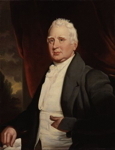
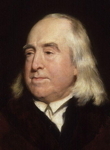


-
William Cobbett (1763-1835), Various Works
- Key words: the (money) system, system of corruption, corruptions; paper money system; the operations of this grand machine; the Fundholders; aristocracy; monied interest; paper-aristocracy; several systems; system of paper-money; the Thing; the Boroughmongers; the Government vortex; the necessities of the system; The set of men that now rule; the OUTS; tax-eaters
- “Paper Aristocracy” (24 Sept. 1804). The extract comes from a Source].
- "Duke of York. (Continued)", Political Register, (February, 1809). [Source].
- Letters 2 and 3 from Paper against Gold (1810). [Source].
- Letter "To the People of the United States of America, On the Present Internal Situation of England, as far as regards Finance" (12 Dec. 1815). [Source].
- “The Royal Family of England”, (Feb. 10, 1816).[Extract]. Key words: The Thing; Boroughmunger;, a passive tool, mere puppets, a mere instrument; he who grants pensions, or bestows sinecures; some bargain for votes; a band of great nobles; sham elections, bribery and corruption, Such is the government of England; such is the thing.
-
Jeremy Bentham (1748-1832), Various Works
- Key words: The Sinister Interest, the ruling one; the sub-ruling few, political fallacies
- Plan of Parliamentary Reform (1817)
- Codification Proposal (1822), Section 1. "In every Political State, the greatest happiness of the greatest number requires, that it be provided with an all-comprehensive body of law". [Source].
- “Historical Preface" to A Fragment on Government (1823). [Source].
- The Book of Fallacies (1824)
- Chap. XXIV “Special Juries,” Principles of Judicial Procedure (1827). [Source].
- Constitutional Code (1827-30)
-
Percy Bysshe Shelley (1792-1822), A Philosophical View of Reform (1820)
- Chap. II "On the Sentiment of the Necessity of Change". [Source].
-
John Wade (1788-1875), The Black Book: An Exposition of Abuses in Church and State (1831, 1835)
- Key words; a who's who of those who live at tax-payer expence. key words: oligarchs - Oligarchical abuse, oligarchical interest, this devouring clan of Oligarchs, an usurping Oligarchy, oligarchical government, the great Oligarchy of the state, a perpetual oligarchy of self-elected individuals, the government of an oligarchy with selfish and limited interests, a plundering oligarchy and intolerant church; sinecure; classes; interests; corruptive influence; classes who prey on the community; the System; the “Ins” and the “Outs”; Tory plunderers; functionaries; the few vs. the many; favoured caste; the industrious orders, the middling and industrious orders; faction
- “Dedication to the People” (1 Feb. 1831). [Source].
- Chap. I. “Church of England” (1835). [Source].
- Chap. V. “Civil List” (1835). [Source].
- Chap. VII. “The Aristocracy" (1835). The extract comes from a Source].
- Chap. XI. “Taxation and Government Expenditure” (1835). [Source].
- Chap. XV. “Places, Sinecures, Reversions, Half-Pay, and Superannuations” (1835). [Source].
-
Thomas Hodgskin (1787-1869)
- Key words; legal right to property, taxes, govt. functionaries, state defined property designed to protect interests of rulers
- Travels in the North of Germany (1820)
- The Natural and Artificial Right of Property Contrasted (1832) , "Letter the Third. The Legal Right of Property". [Source].
-
James Mill (1773-1836), The Political Writings (1815-1836)
- Key words: aristocracy, caste, Church establishment, State of the Nation
- “Caste,” Encyclopaedia Britannica (1824). [Source].
- “Government,” Encyclopaedia Britannica (1824). [Source].
- “State of the Nation,” The London Review (Apr. 1835). [Source].
- “Aristocracy,” The London Review (Jan. 1836) , [Source].
English Political Economists↩
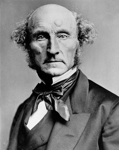
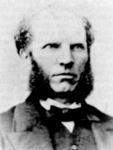
-
J.S. Mill (1806-1873), The Subjection of Women (1869) - class and the law of force
- 1st chapter. [Source].
-
John Elliot Cairnes (1823-1875), The Slave Power (1862)
- Key words: "the (particular) class for whose special behoof it (slavery) exists," the class who keep slaves, servile régime, the upper classes, the ascendant class, the mean whites (a class at once degraded and dangerous, white trash, crackers), free peasants, the three classes: the slaves, the slave-holders, the idle and lawless rabble, the Slave Power, the privileged (one) thirtieth part, one party, despotism of the wealthy few, the paramount power in the Union, uncontrolled despotism, a compact oligarchy, organised barabrism, a degraded class, the present ruling class.
- Chap. III. “Internal Organization of Slave Societies.” [Extract]
- Chap. V. “Internal Development of Slave Societies.”
19th Century French Classical Liberals↩

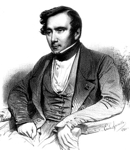
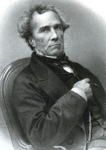
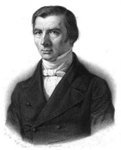
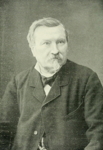

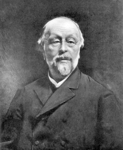

-
Jean-Baptiste Say (1767-1832), A Treatise on Political Economy (1803, 1819)
- Key words: tax-payer, tax-gatherer, productive classes, labouring classes, public functionary/functionaries
- selections from Book I. "Of the Production of Wealth":
- Chap. XVIII "Of the Effect upon National Wealth, resulting from the productive Efforts of Public Authority" [Source]
- selections from Book III. "Of the Consumption of Wealth":
-
Augustin Thierry (1795-1856), The Formation and Progress of the Tiers Etat (1853)
- Key words: conquest, Third Estate
- “Rise of the Bourgeoisie of the Middle Ages” (1853). [Source].
- Gustave de Beaumont (1802-1866), Ireland: Social, Political, and Religious (1839) - the Irish aristocracy
-
Frédéric Bastiat (1801-1850), Various Works
- Key words: the British “oligarchy”; “les spoliateurs” (the plunderers) or “la classe spoliatrice” (the plundering class) vs. “les spoliés” (the plundered) or “les classes spoliées” (the plundered classes); “la spoliation extra-légale” (extra-legal plunder) and “la spoliation légale” (legal plunder); “parasite”, “viol” (rape), “vol” (theft), and “pillage”; “la spoliation partielle” (partial plunder); “la spoliation universelle” (universal plunder) or “la spoliation réciproque” (reciprocal plunder); “la spoliation permanente” (permanent plunder); “la classe électorale” (the electoral classe); “les dissonances sociales” (the social disharmonies) such as plunder and oppression, or “les causes perturbatrices” (disturbing factors); “legal parasitism”; “la spoliation par l’impôt s’exerce sur une immense échelle” (plunder by means of taxation is excercised to a high degree); stages of plunder in history: First of all, there is WAR... Then there is SLAVERY. ... Next comes THEOCRACY ... Lastly, there is MONOPOLY; Malthusian limits to state plundering
- "The English Oligarchy," Cobden and the League (1845): Key words: conquerors; proletarians; oligarchy; aristocracy; “class struggle” (fight to the death); legal plunder; mutual plunder; productive class; organized, systematic, persistent, pitiless exploitation; a small number of exploiters and a large number of exploited beings. [Draft translation].
- “The Physiology of Plunder” (ES2 1) (late 1847). [Source].
- “Two Moral Philosophies” (ES1 2) (late 1847). [Source].
- "Property and Plunder: 5th Letter" (24 July, 1848). [Source].
- Charles Renouard (1794-1878), "Parasites", DEP (1852) and Lalor's Cyclopedia (1899). [Source].
- Ambroise Clément (1805-1886), "Functionaries", DEP (1852) and Lalor's Cyclopedia (1899). [Source].
-
Gustave de Molinari (1819-1912), Various Works
- Key words: budget eating class, place-seeking, domination par la conquête; une exploitation régulière; aristocratie de propriétaires; une hiérarchie militaire; privilège des exemptions d'impôts ; des populations industrieuses; A leurs déprédations capricieuses et arbitraires, ils substituèrent des redevances fixes et régulières; Les classes industrieuses; cette Californie religieuse du moyen âge , les serfs qui avaient racheté leur liberté purent la conserver; Les classes assujetties; une bourgeoisie industrieuse; les monopoles politiques et économiques de l'aristocratie; les classes nobles; cette noblesse naturelle
- "Noblesse" (Nobility) DEP (1852) also in Lalor's Cyclopedia (1899). [Source].
-
Alexis de Tocqueville (1805-1859), Various Works
-
Democracy in America (1835, 1840)
- Key words: the governed or those governed; those governing, those who govern, the class that leads public affairs; countries organized aristocratically and hierarchically; sovereign power; great parties vs. small ones; faction; governmental centralization vs. administrative centralization. Despotism: the legal despotism of the legislator, the despotism of one man, the despotism of parties - the despotism of factions - the tyranny of a party, the despotism of the majority, the despotism of the greatest number; military despotism. Tyranny: the tyranny of the majority - Tyranny of democracy - the petty tyranny of the people; the tyranny of opinion; the tyranny of the social power; the tyranny of legislators - the legislative tyranny of the states - the tyranny of the government; the tyranny of laws
- Part I, CHAPTER 5: "Necessity of Studying What Happens in the Individual States before Speaking about the Government of the Union" [Source]
- Part II, CHAPTER 2: "Of Parties in the United States" [Source]
- Part II, CHAPTER 5: "Of the Government of Democracy in America" [Source]
- Part II, CHAPTER 6a: "What Are the Real Advantages That American Society Gains from the Government of Democracy?" [Source]
- Part II, CHAPTER 7: "Of the Omnipotence of the Majority in the United States and Its Effects" [Source]
- Part II, CHAPTER 8: "Of What Tempers Tyranny of the Majority in the United States" [Source]
- Part IV, Chap. 6: "What Type of Despotism Democratic Nations Have to Fear" [Source]
- Part IV, CHAPTER 7a: "Continuation of the Preceding Chapters" [Source]
-
The Old Regime and the Revolution (1859)
- Key words: administrative centralization, administrative tutellage, centralization, privileged class, functionaries, public functionaries, office-holders, classes/caste, place-hunters
- Book Second: CHAPTER II.: THAT WE OWE “ADMINISTRATIVE CENTRALIZATION,” NOT TO THE REVOLUTION OR THE EMPIRE, AS SOME SAY, BUT TO THE OLD REGIME. [Source].
- Book Second: CHAPTER V.: HOW CENTRALIZATION CREPT IN AMONG THE OLD AUTHORITIES, AND SUPPLANTED WITHOUT DESTROYING THEM. [Source].
- Book Second: CHAPTER IX.: THAT THESE MEN, WHO WERE SO ALIKE, WERE MORE DIVIDED THAN THEY HAD EVER BEEN INTO PETTY GROUPS, EACH INDEPENDENT OF AND INDIFFERENT TO THE OTHERS. [Source].
-
Democracy in America (1835, 1840)
-
Hippolyte Taine (1828-1893), The Origins of Contemporary France (1890)
- Key Words. The Rulers: local sovereigns with the subordinate lieutenants and agents; veritable beasts of prey; the most notorious political bandits; the governing rabble; the eagerness to get any office; the subordinate sovereigns; commissioners; functionaries; the governing class; the nomadic and interloping class; a corps of inquisitors and terrorists; swarms of Jacobin locusts, this cloud of destructive insects; the political agents; a small feudality of brigands superposed on conquered France; the accounts of revolutionary taxation, of forced loans, and of pretended voluntary gifts, still form a bottomless pit; The chicken being officially plucked in this way, the plucked pigeon, the vultures, great and small, could freely use their beaks and talons; colossal spoil; There are no owners for this property but the nation, an indeterminate, imperceptible personage; no barrier other than so many seals exists between the spoils and the despoilers, that is to say, so many strips of paper held fast by two ill-applied and indistinct stamps. Bear in mind, too, that the guardians of the spoil are the sans-culottes who have made a conquest of it; Such, from the top to the bottom of the ladder, at every stage of authority and obedience, is the ruling staff of the revolutionary government. The Napoleonic State: everyone aspires to be a state functionary; the state (Napoleon) offers "prizes": These prizes consist of offices, the various employments of the State, political, military, ecclesiastical, judiciary, administrative and university, all the honors and dignities which it dispenses, all the grades of its hierarchy from the lowest to the highest, from that of corporal, college-regent, alderman, office-supernumerary, assistant priest up to that of senator, marshal of France, grand master of the university, cardinal, and minister of State; the modern state is the monopolizer and (is) omnipresent; state jobs are "the great social staircase" - the steps rise regularly above each other in continuous file; it is through him (Nap) that they retain their place; he controls their promotion and by sponsors whom he knows; a great centralized State whose intervention is universal; Nap appoints everyone personally; hands out decorations and the Legion of Honor; the mechanism of the state has as its 'central motor" the craving for success, as the universal mainspring, unscrupulous ambition.
- The French Revolution, vol. 3 The Revolutionary Government (1883): Book VII: The Governors and Book VIII: The Governed, especially Bk VII, chap. III "The Rulers (continued)" [Source]
- The Origins of Contemporary France: The Modern Regime, vol. 1 (The New Napoleonic State): Book II: Formation and Character of the New State and Book III: Object and Merits of the System, especially Bk III, chap.III (Careers in the new state) [Source]
-
Yves Guyot (1843-1928), Socialistic Fallacies (1910)
- Key words: the proletariat as the ruling class, sanctions of allurement and coercion, a class which oppresses and a class which is oppressed, a class of officials and a class of drudges, the virtues of convents and of barracks, a policy of spoliation (plunder), a servile class, they have made the party an object in itself, the collectivist state
- Book VII: Collectivist Organisation [especially Chap. II The Class War and Political Conditions] [Source]
19th Century English Classical Liberals and Cobdenites↩
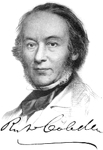


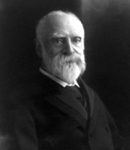
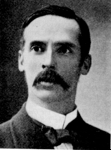
-
Richard Cobden (1804-1865), Speeches (1842-1850)
- Key words: industrious classes; middle classes ; aristocracy, the aristocracy and squire-archy; landowners, landed aristocracy; landed oligarchy, a most ignoble oligarchy - sugar oligarchy; hereditary legislators; sinister influences; we are governed by classes and interests, colonial interest; a class question
- FREE TRADE. II. CORN-LAWS.—MR. VILLIERS' ANNUAL MOTION. HOUSE OF COMMONS, FEBRUARY 24, 1842. [Source].
- FREE TRADE. XIV. LONDON, JANUARY 15, 1845. [Source].
- FREE TRADE. XVIII. BIRMINGHAM, NOVEMBER 13, 1845. [Source].
- FREE TRADE. XIX. LONDON, DECEMBER 17, 1845. [Source].
- PARLIAMENTARY REFORM. I. HOUSE OF COMMONS, JULY 6, 1848. [Source].
- PARLIAMENTARY REFORM. II. LONDON, NOVEMBER 26, 1849. [Source].
- FREE TRADE. XXIV. LEEDS, DECEMBER 18, 1849. [Source].
- FINANCE. III. HOUSE OF COMMONS, MARCH 8, 1850. [Source].
-
Herbert Spencer (1820-1903), The Principles of Sociology (1873)
- Key words: industrial vs. militant societies. Key words: ruling agents, advising and executive agents, ruling agency, the class of warriors, the militant class and the land-owning class, conquerors and conquered, the inner few have gained in authority at the expense of the outer many, these three governing elements, a passive class, the tri-une political structure; the absolute ruler, entirely subordinating the select few and the many; these industrial communities and the surrounding militant communities
- "The Class Bias" in Principles of Sociology (1873) - a general statement of class interests. [Source].
- Part V. “Political Institutions” in The Principles of Sociology, vol. 2 (1882)
-
Auberon Herbert (1838-1906), The Voluntaryist Creed 1908)
- Key words: the great lawmaking machine, the great machine; vast systems of machinery; the machine makers; government lawmaking machine; the rule of the majority and the subjection of the minority; the 3/5ths vs. the 2/5ths; special interests; party interests; those who rule and are ruled; our lords and masters; slave owners as well as slaves; the conquering race and the conquered race; your conquerors; the splitting of a nation into hostile factions; the great conflict, two hostile armies, conflict for power over each other , many systems of state force, that unnatural, denationalizing, miserable warfare, a half-disguised civil war; the omnipotent vote, the final ownership of property being vested in the voter,; the party interests buy the larger half of the nation, buying up of the groups, to put up the ownership of the individual to public auction, The power of the majority wanes, and the power of the minority grows, and the oppressor and the oppressed change places, each group has its market price, the wholesale buying of men,; our official classes; the body of officials; governing classes; Our bureaucrats, with their universal systems; the bureaucratic caste; its bureaucratic tyrants; the horde of countless officials, who would form a bureaucratic, all-powerful army; a caste, that administers the administered; every huge administrative system; governments in their true position of agents, and not, as they are today, of autocrats and masters of the nation; the great serpent of bureaucracy, a caste, that administers the administered, its bureaucratic tyrants; the great system itself; our systems of power; the struggle for the possession of this unlimited power; systems of state force; the great conflict ; conflict for power over each other ; those who are seeking for power over you, the great systems of taxation, which make of the individual mere tax material, as conscription makes of him mere war material; or the great systems of compulsory education,
- "Mr. Spencer and the Great Machine" (1906) [Extract] [Source]
- "A Plea for Voluntaryism" (1908) [Extract] [Source]
-
James Bryce (1838-1922) - Modern Democracies (1921) - a revised and updated version of The American Commonwealth (1888)
- Key words: party machine, money power, spoils system, party organizers, party managers, politicians becoming a professional class, cliques, the Ring, the Few, patronage; oligarchies of the Sword, of the Purse, and of the Intellect; oligarchy, Committees; "carnival of jobbery and corruption"; the Boss.
- The United States
- Part III:
- J.A. Hobson (1858-1940), Imperialism (1902) - economic parasites
19th Century American Works↩
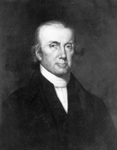

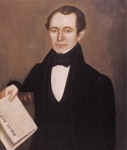
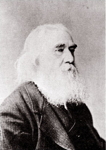
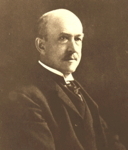
- John Taylor (1753-1824), An Inquiry into the Principles and Policy of the Government of the United States (1814)
-
John C. Calhoun (1782-1850), A Disquisition on Government (1849)
- Key words: on the conflict between tax-payers and tax-consumers;
- 3 extracts: first section where he defines his idea of the state and its inherent class conflict (pp. 5-23); a middle section on the dangers of class conlfict in a system with a numerical majority in power (pp. 31-37); and a final section where he discusses two historical examples - ancient Rome and modern Britain (pp. 67-78). [Source].
-
William Legget (1801-1839), Democratic Editorials (1984)
- Key words: office-holders and privileged wealthy vs. laboring classes; despotism; benefits for a few ("chartered aristocracy", paper money aristocracy) vs. equal rights of the people; little knots of monied men; all sorts of privileged bodies; exclusive privileges to the few; privileged money-changers; a contemptible oligarchy; MONOPOLIES of all kinds, whether of rank, wealth, or privilege; Paper Dynasty; The aristocratick party; the universal right of equal freedom vs. the grant of special corporate privileges; an almost innumerous army of office-holders; and that the phalanx of placemen; army of public stipendiaries; the favoured few; a band of gentlemen pensioners
- TRUE FUNCTIONS OF GOVERNMENT, Evening Post, November 21, 1834. [Source].
- RICH AND POOR, Evening Post, November 4, 1834. [Source].
- UNCURRENT BANK NOTES, Evening Post, March 10, 1835. [Source].
- THE COURSE OF THE EVENING POST, Evening Post, May 18, 1835. [Source].
- THE STREET OF THE PALACES, Plaindealer, December 10, 1836. [Source].
- THE CREDIT SYSTEM AND THE ARISTOCRACY, Plaindealer, August 26, 1837. [Source].
-
Lysander Spooner (1808-1887), Various works
- Key words: 1. The nominal rulers (the emperors and kings and parliaments (in Europe); the presidents, senators, and representatives (in the US)), the real rulers (the great lenders of blood-money, loan mongers, that class of money-lenders ) are those powerful banks who lend money to the state to fund the national debt; governments are in reality only great bands of robbers and murderers; repaid with great monopolies in banking, like the Banks of England, of France, and of Vienna; tariffs on competing imports, they give great monopolies to certain branches of industry,; unequal taxation, exempt wholly or partially the property of these loan-mongers; the ostensible government are merely their tools. 2. bands of robbers; tyrants, living solely on plunder, and on the labor of their slaves; All the great governments of the world have been mere bands of robbers, who have associated for purposes of plunder, conquest, and the enslavement of their fellow men; the desires of one class of persons to plunder and enslave others, and hold them as property; the robber class, the slave holding class, the law-making class; The whole purpose of this legislation is simply to keep one class of men in subordination and servitude to another.
- "On the real governing power in the country" (1870) - from No Treason VI. Sections XVIII and XIX. [Extract] and [Source].
- "Governments as Bands of Robbers" (1882) - from Natural Law; or the Science of Justice, chap. III "Natural Law contrasted with Legislation". [Extract] and [Source].
-
William Graham Sumner (1840-1910) - Various Works
- Key words: plutocracy; jobbery (place seeking); economic earth hunger vs. political earth hunger; Separation of State and Market
- “The Forgotten Man and Woman” (1883). [Extract] [Source].
- “On the Case of a Certain Man who is never thought of” (1884). [Source].
- “The Case of the Forgotten Man farther considered” (no date). [Source].
- “What makes the Rich Richer and the Poor Poorer?” (1887). [Source].
- “State Interference” (1887). [Source].
- “Earth Hunger or the Philosophy of Land Grabbing” (1896). [Extract]. Key words: the servile classes; the emancipation of the servile classes; the labor class; the great forces of class change; the discovery of America was the winning of a new continent for the labor class; earth hunger, the apparently insatiable desire to get more land, higher wages; he earth hunger of the civilized men has produced a collision of the civilized and the uncivilized, in which the latter have often perished; economic earth hunger vs. olitical earth hunger - the appetite of states for territorial extension as a gratification of national vanity.
- “Separation of State and Market” (no date). [Extract]. Key words: Those who had state power found capital indispensable; they made alliances with those who had it; democratic absolutism; interests, meaning by that, groups of persons united by a desire for the success of the same enterprises and seeking pecuniary gain from that success; the state has to take sides with some interests against others; The state is the greatest monopoly of all, the best prize of base struggles, and the most powerful engine by which some men may exploit others.
- “Democracy and Plutocracy” (no date) which also includes “Definitions of Democracy and Plutocracy” and “The Conflict of Plutocracy and Democracy.” [Extract] Key words: private interests pursued by getting legislative device in their own hands; the device, when once set up, will itself become the prize of a struggle; autocracy, aristocracy, theocracy, hierocracy, bureaucracy, and plutocracy is a political form in which the real controlling force is wealth; A plutocrat is a man who, having the possession of capital, and having the power of it at his disposal, uses it, not industrially, but politically; Modern plutocrats buy their way through elections and legislatures, in the confidence of being able to get powers which will recoup them for all the outlay and yield an ample surplus besides; plutocracy is an abuse of legislation and of political institutions.
20th Century Works↩
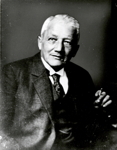
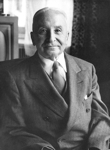



-
Franz Oppenheimer (1864-1943),
- Key words: the economic vs. political means of acquiring wealth
- The State: Its History and Development viewed Sociologically (1908, 1922), "The Genesis of the State” (1908). [Source].
- Hillaire Belloc, The Servile State (1912) (LF, 1977) [This book is not available online.]
- Key words: - "that arrangement of society in which .... a number of ... families and individuals are constrained by positive law to labor for the advantage of other families and individuals", status replaces contract in the relationship between employers and employed, e.g. minimum wages
- Sction 1 "Definitions."
- Section 9 "The Servile State has Begun."
-
Ludwig von Mises (1881-1973)
- Key words: Mises rejects the notion of "class" as a mistaken Marxist notion, but does leave room for the idea of "estates and castes",
- Socialism (1922) (LF, 1981) , Chap. 20. "The Clash of Class Interests and the Class War". [Source].
- Bureaucracy (1944) (LF, 2007), "V: The Social and Political Implications of Bureaucratization". [ Source].
- "The Clash of Group Interests" (1945). This is not available online here but can be found at the Mises institute: Ludwig von Mises, The Clash of Group Interests and Other Essays. With a Preface by Murray N. Rothbard. Occasional Paper Series #7. (New York: The Center for Libertarian Studies, 1978.) Originally published in Approaches to National Unity (1945). Online at the Mises Institute <https://mises.org/library/clash-group-interests-and-other-essays>.
-
Friedrich Hayek (1899-1992), The Road to Serfdom (1944) (University of Chicago Press, 1976). (not available online)
- VIII. "Who, Whom?" pp. 101-18
- X. "Why the Worst get on Top", pp. 134-52
- Anthony de Jasay (1925-)
-
Gordon Tullock (1922-2014), Selected Works (LF) (not available online)
- vol. 5. The Rent-Seeking Society (LF, 2005)
- vol. 6. Bureaucracy (LF, 2005
- "The Politics of Bureaucracy" (1965) - "The Politician's World"
- vol. 8. The Social Dilemma of Autocracy, Revolution, Coup d'Etat, and War (LF, 2005)
- "The Exploitative State" (1974)
- "The Goals and Organizational Forms of Autocracies" (1987)